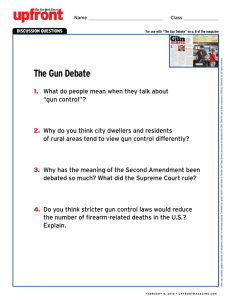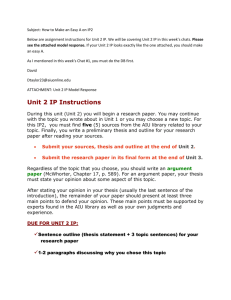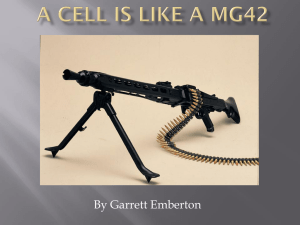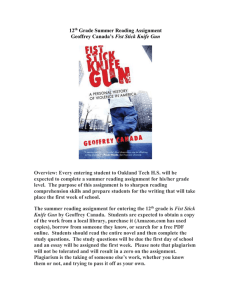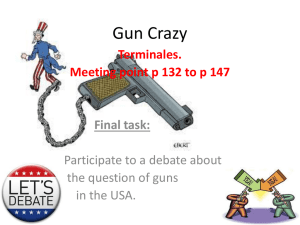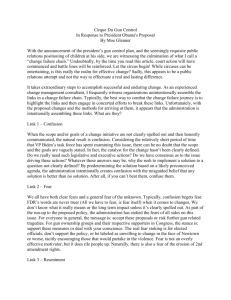Document
advertisement
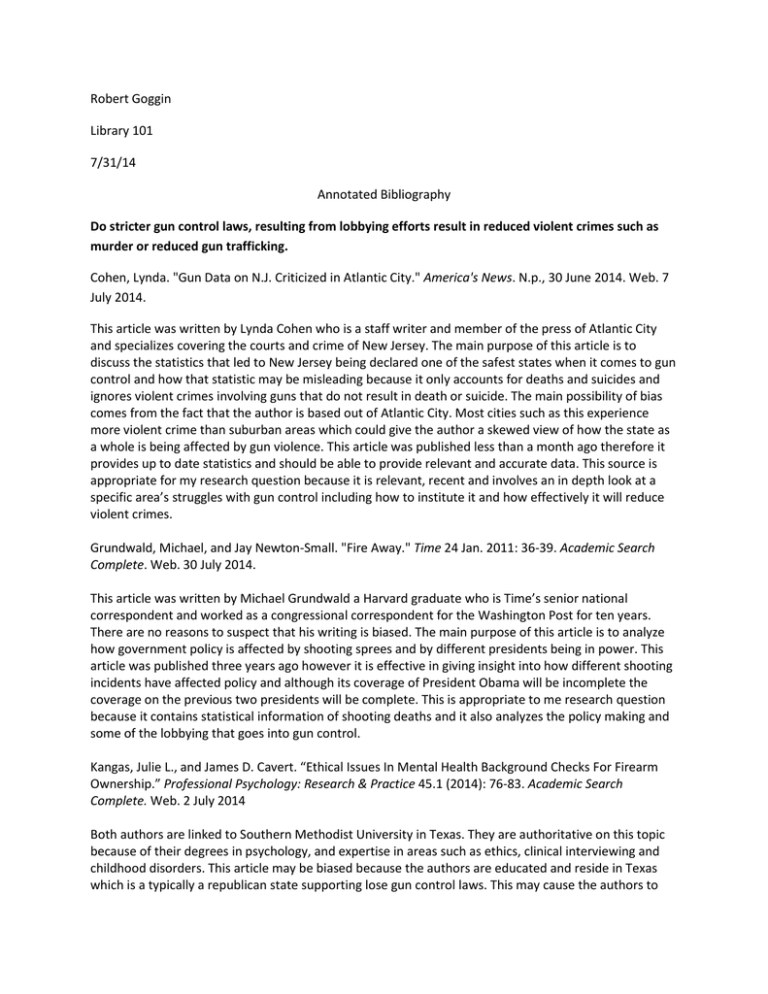
Robert Goggin Library 101 7/31/14 Annotated Bibliography Do stricter gun control laws, resulting from lobbying efforts result in reduced violent crimes such as murder or reduced gun trafficking. Cohen, Lynda. "Gun Data on N.J. Criticized in Atlantic City." America's News. N.p., 30 June 2014. Web. 7 July 2014. This article was written by Lynda Cohen who is a staff writer and member of the press of Atlantic City and specializes covering the courts and crime of New Jersey. The main purpose of this article is to discuss the statistics that led to New Jersey being declared one of the safest states when it comes to gun control and how that statistic may be misleading because it only accounts for deaths and suicides and ignores violent crimes involving guns that do not result in death or suicide. The main possibility of bias comes from the fact that the author is based out of Atlantic City. Most cities such as this experience more violent crime than suburban areas which could give the author a skewed view of how the state as a whole is being affected by gun violence. This article was published less than a month ago therefore it provides up to date statistics and should be able to provide relevant and accurate data. This source is appropriate for my research question because it is relevant, recent and involves an in depth look at a specific area’s struggles with gun control including how to institute it and how effectively it will reduce violent crimes. Grundwald, Michael, and Jay Newton-Small. "Fire Away." Time 24 Jan. 2011: 36-39. Academic Search Complete. Web. 30 July 2014. This article was written by Michael Grundwald a Harvard graduate who is Time’s senior national correspondent and worked as a congressional correspondent for the Washington Post for ten years. There are no reasons to suspect that his writing is biased. The main purpose of this article is to analyze how government policy is affected by shooting sprees and by different presidents being in power. This article was published three years ago however it is effective in giving insight into how different shooting incidents have affected policy and although its coverage of President Obama will be incomplete the coverage on the previous two presidents will be complete. This is appropriate to me research question because it contains statistical information of shooting deaths and it also analyzes the policy making and some of the lobbying that goes into gun control. Kangas, Julie L., and James D. Cavert. “Ethical Issues In Mental Health Background Checks For Firearm Ownership.” Professional Psychology: Research & Practice 45.1 (2014): 76-83. Academic Search Complete. Web. 2 July 2014 Both authors are linked to Southern Methodist University in Texas. They are authoritative on this topic because of their degrees in psychology, and expertise in areas such as ethics, clinical interviewing and childhood disorders. This article may be biased because the authors are educated and reside in Texas which is a typically a republican state supporting lose gun control laws. This may cause the authors to lean toward unrestricted gun laws. The main purpose of this article is to discuss the issues with background checks when trying to purchase firearms for the mentally disabled. It is relevant to my research question because I am interested in the lobbying efforts around this issue and how people with mental disorders are forced to act outside the laws in order to attain firearms and potentially commit violent crimes. Because this article was published in 2014 it provides current and relevant information regarding my research question. This article is appropriate for my research question because it is current and looks at the specific aspects of illegal firearm transactions as well as the law making aspects of this issue. Kleck, Gary. "Crime, Culture Conflict and the Sources of Support for Gun Control. A Multilevel Application of the General Social Surveys." American Behavioral Scientist 39.4 (1996): 387404. Worldwide Political Abstract Database. Web. 10 July 2014. This article was written by Gary Kleck a criminologist and professor of criminology at Florida State University who has published two books of gun control Point Blank, and Targeting Guns. In this article his purpose is to investigate any link between support for gun control and high crime rates, poor victimization or fear of crime. The article is published in American Behavioral Scientist which is a reputable peer review scholarly journal article that is published 14 times a year. Because of the logical reasoning and use of statistical evidence from 4 different cities there seems to be no biases in this article. This is relevant to my research question because it deals with why some people support gun control laws and others do not which can result in why certain areas lobby for or against gun control as my research question states is a part of my research. This article was published in 1996 which when examining the data uses is not very long ago. Statistics such as the ones the author was using are the results of longitudinal studies and can take years to gather, therefore the article is still relevant to my research question. Phillips, Scott W., Kim Dae-Young, and James J. Sobol. "An Evaluation of a Multiyear Gun Buy-back Programme: Re-examining the Impact on Violent Crimes." International Journal of Police Science & Management 15.3 (2013): 246-61. Academic Search Complete. Web. 31 July 2014. The author of this article, Scott Phillips, is an associate professor of criminal justice at Buffalo State which he received a Ph.D. in from the State University of New York. His article may be biased because he has lived and been educated in New York which is a state that leans toward the democratic party and stricter gun control laws. The main purpose of this article is to analyze statistics related to a gun buyback program and study how it affects violent crime. This article was published in 2013 therefore the statistics are recent and relevant to my study. This is appropriate for my research question because it is looking at how stricter gun control policies and other policies that get guns off the street affect violent crime in an area which is the main focus of my research question. Stenning, Phillip C. "Long Gun Registration: A Poorly Aimed Longshot." Canadian Journal of Criminology & Criminal Justice 45.4 (2003): 479-88. Academic Search Complete. Web. 31 July 2014. Professor Stenning is a member of the School of Criminology and Criminal Justice Arts at Griffith University. He has written a book and multiple peer reviewed articles on criminology. There is apparent reason to believe that he is biased. The main purpose of this article is to analyze the effectiveness of long gun registration in Canada. The article is from 2003 however there have been no major changes to Canadian gun control laws since then so the analysis should still be accurate. This is appropriate for my research question because it pertains to how different types of law in other countries are able to reduce violent crime and murder rates. Before I learned all I have about doing research in this class my research strategy would normally begin with a basic Google search which usually lead to a Wikipedia article that I would use to get all of my basic background information and pick some key words from. After that I would usually check out as many books as I could find at the library. Then I would look up my key words in the book’s glossary and try to find useful information. It was tedious. At times I would search through a book for extensive amounts of time to no avail which was frustrating. My original research question was a little too specific. If I was to change it I would remove the section that wanted to look into lobbying efforts. The information was too hard to find and I would have been better off without it while not including that information would not have taken too much away from a potential paper. A successful research strategy that I used was to adjust my search terms with key terms that I found in other sources. This allowed me to find new articles and other sources that did not come up in my original search. If I was writing a research paper for another class I would first use the search tools such as quotation marks and an asterisk. These allowed for more sources to not be eliminated from results because of the use of specific word endings. The next skill I would use is the ability to adapt my search using new key terms that I found in new sources to find more and better sources.
